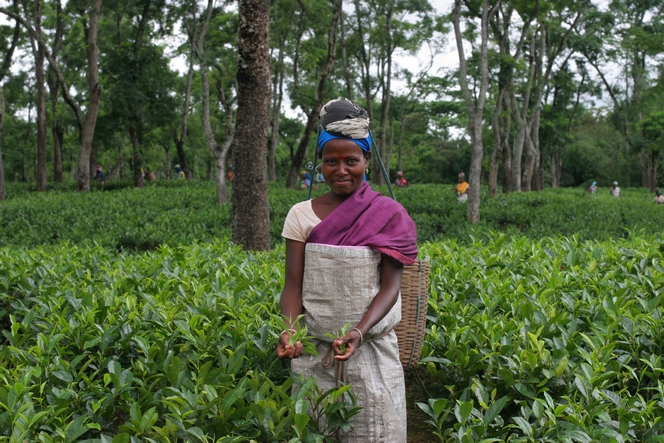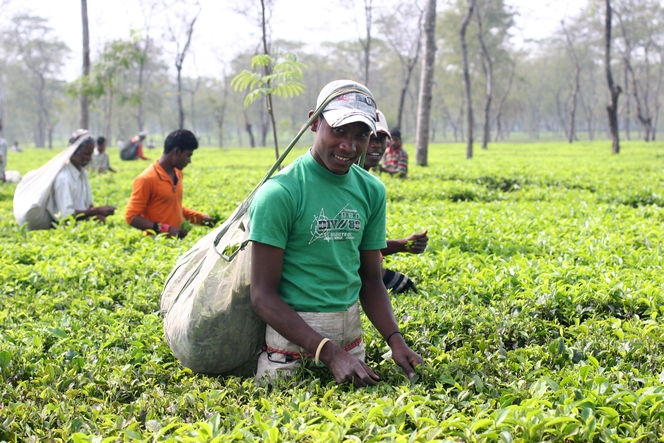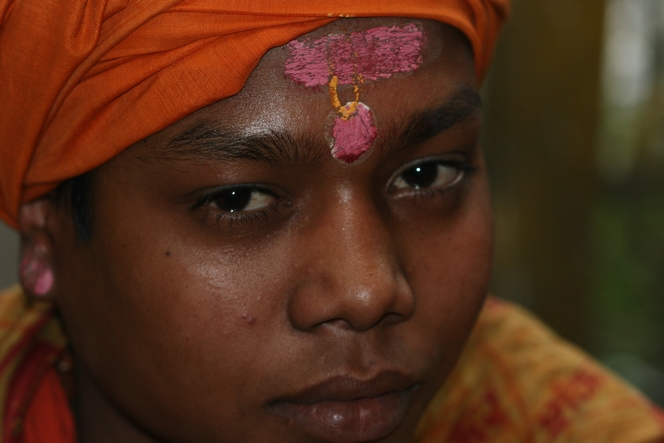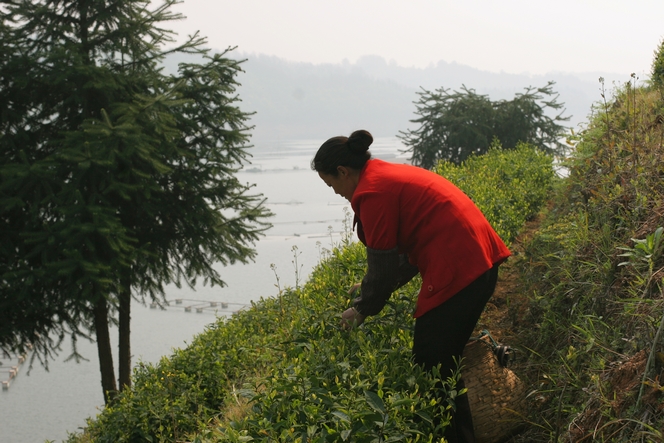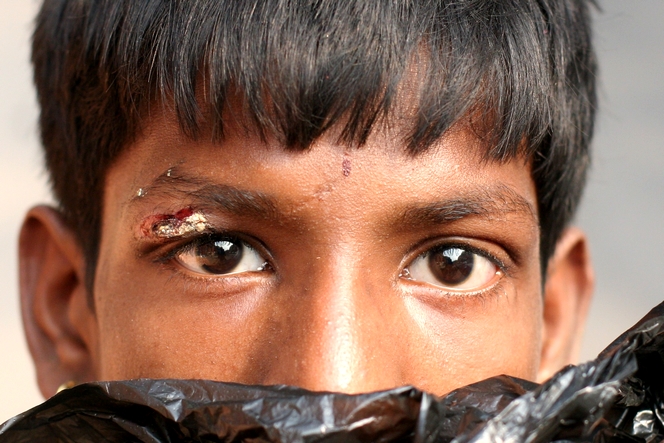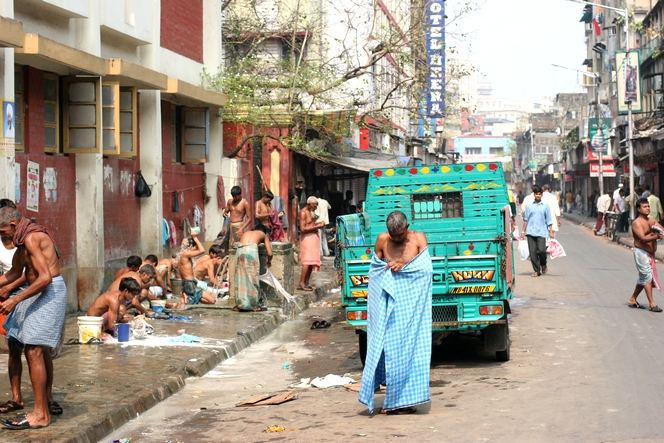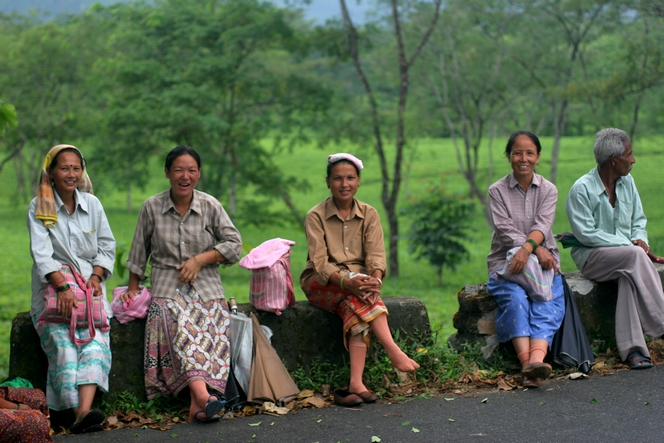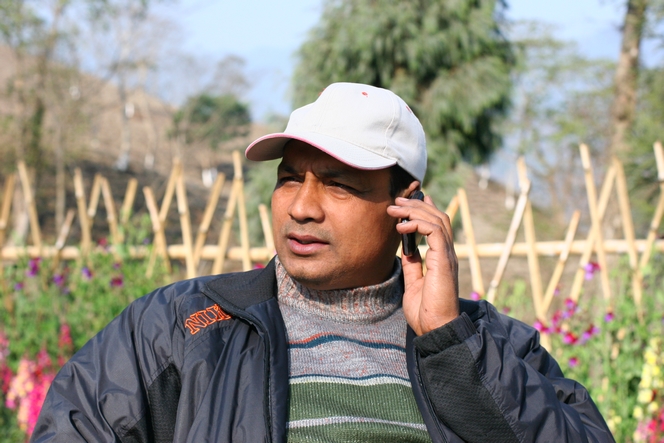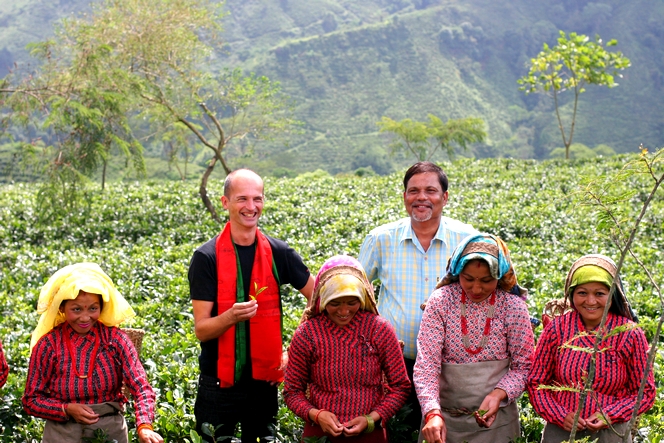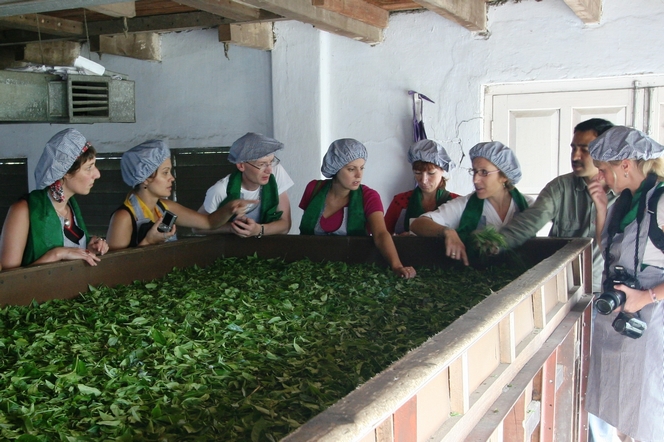The yield per hectare here in Assam is four times higher than in Darjeeling, and totals two tonnes a year. Each tea plant produces such a quantity of leaves that between March and November, the shoots on each bush are plucked at least once a week. A record! Yet this charming tea plucker on the Dufflating Tea Estate does not seem overwhelmed by the scale of the task; in fact she looks quite happy.
Tea people
Tea harvesting by the Adivasis in India
In the Dooars region of India, tea is often harvested by the people known as the Adivasis. Often despised by other Indians because they are right at the bottom of the social ladder, they benefit from positive discrimination, along with the lower castes. They don’t get much attention, which is another reason to talk about them here.
The Adivasis are one of India’s biggest tribal populations. They descend from the aborigines and live in the north-east of the country.
I took this photo at Meenglas, near Mal Bazaar, a few kilometres from the border with Bhutan. The Dooars region doesn’t produce very good quality tea, but that’s not important here. It was the smiling faces of these workers that I wanted to tell you about, not the rather coarse leaves filling their bags.
Shivaite priest near the Darjeeling temple
I left for Kolkata three days ago, and today I am in Jorhat, in Assam, a region still considered dangerous until very recently. The situation here has greatly improved and, at the moment, it finally seems possible to visit this state in the north east of India, near Myanmar.
In India, whether you are a follower of Vishnou or Shiva, it is common to ask for the blessing of a priest before you undertake such a journey. This is the face of a young Shivaite priest who practices every day near the Darjeeling temple. Just don’t ask him to smile: he makes up for his tender age with an unwavering impassivity.
Taiping Hou Kui : a very expensive tea from China
Taiping Hou Kui is harvested for just 25 days a year, generally between 20 April and 15 May. For the rest of the year the tea plant is allowed to grow without having its leaves plucked. This concentrates the harvest on the best season.
Mrs Zha has a pretty plot of land on the edge of lake Taiping. She is very busy during this plucking period. Taiping Hou Kui is one of the most expensive teas in China, and its price can reach thousands of yuan per kilo.
In Kolkata, this kid survives by collecting rubbish
A kid comes up to me as I walk through Kolkata. He asks me to take his photo. He lives on the street, surviving by collecting rubbish which he sells on for next to nothing. I agree to take his picture and suggest he smiles, and above all removes the plastic covering his face. He doesn’t. He stares intently into the lens. And sniffs the glue in his bag at the same time, incapable of stopping.
A friendly atmosphere at the public tap
Water is quite scarce in Kolkata and people congregate at the public tap to wash their laundry or themselves. There is a friendly atmosphere among the neighbours.
You can see that people still protect their modesty, even though they wash in the street. The man in the foreground getting changed beneath his towel reminds me of the contortions we go through back in this country, after a swim in the sea, as we try to put our underwear back on with one hand.
Here, it is like being at the beach. But without the sea.
We have just received a new first flush Darjeeling !
We have just received a new first flush Darjeeling, Longview DJ1, the first lot of the year from the Longview Tea Estate. Because of its location, this garden fortunately avoided the road blocks recently put in place, which I told you about last time, and managed to get its tea to Kolkata.
In the mouth, this tea develops planty, almondy notes. It has a fresh start, followed by delicate aromas of camphor.
These smiling faces belong to pluckers who work at Longview, enjoying a well-earned break.
Abhishek Dev, tea grower at Teesta Valley Tea Estate
This is Abhishek Dev, the tea grower at the Teesta Valley Tea Estate. He is one of six brothers, and most of them work in the tea trade. He started out as assistant manager at Puttabong, then at Sungma, among others. He was then offered a position managing a plantation that was not in a good state.
Everyone in Darjeeling agrees that he has really improved the quality of the teas produced here.
Abhishek had quite a surprise for me when I visited him on 23 February. He had just produced a single lot, especially for me. Just ten kilos of tea, the first Darjeeling of the year, so it was quite an event. The very small quantity is due to the fact that the leaves have not grown much at this stage. So this is an exceptional plucking, due to both its earliness and because it is made up of only very young shoots. In the cup, it has a wonderful subtlety, the freshness of spring, and a unique vitality.
Visiting the Balasun tea plantation
Last week I had the pleasure of visiting the Balasun plantation, in Darjeeling. The plantation got its name from the river Balasun, which runs below it. Anil Jha, who manages the Sungma Tea Estate, and who you can see beside me in this photo, also supervises the Risheehat Tea Estate and the Balasun Tea Estate. He is one of the most respected and most experienced growers in Darjeeling. There are only three or four others with his level of expertise – and authority. I admire him, and I’m also grateful to him, because he was the first person to teach me so much, here on these mountains. We first met 20 years ago, so he has seen me progress, professionally speaking.
Whenever we meet, we talk for hours, united by the same passion.
Le Palais des Thés team in Tomsong
This morning I left for Kolkata. From there I will travel to Darjeeling, probably on Tuesday. The spring harvest will begin soon, and it is time to visit a few plantations, find out more about the crop, and “test the temperature” of the region in more ways than one. Tea plants go to sleep in the winter, because of the cold, and wake up again when the air warms up. Inversely, the people get fired up during the winter months over the issue of independence, and cool down in the spring when the tea and tourist trades pick up again.
There is an important stage in tea processing that I am sorry not to be able to share with you: the “withering”. This involves blowing air – preferably cold – over the leaves, which give off an incredible fragrance like white flowers, lily and jasmine. In this photo taken in Tomsong in October 2010, during a trip with the team, everyone is cupping leaves in their hands and inhaling the wonderful aroma.
If you would like to see some other highlights from our trip, click on this link (in French):
http://www.palaisdesthes.com/fr/le-the/palais-des-thes-darjeeling.htm

